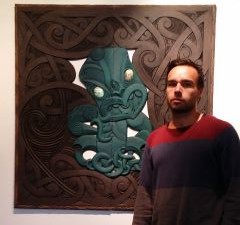Jacob Ashdown
Case Manager
Moana House Recovery Programme

Jacob Ashdown is using skills learned to help improve health and wellbeing for Māori
Jacob Ashdown grew up in the rural town of Kaitangata in South Otago. He never thought that he would go to university, and in fact left school before completing Year 13.
“I did what most young men in Kaitangata do, left school and started working at the local meat processing plant. After three years, I came to the realisation that labouring was not all that it was made out to be and decided to give university a go.”
He is the first person in his family to go to university and one of only a handful of men from Kaitangata to graduate.
Jacob describes his first experiences of University as 'overwhelming' and said that he doubts he would have even made it through the enrolment process had it not been for the support of te Huka Mātauraka – the Māori Centre.
“When I first came to university, I didn't know what I wanted to study so I took an English paper to learn how to write, and some Māori papers, as that is what I was interested in at the time. After my first semester, I decided to take a psychology paper and was hooked from there. Now I am in my final year of my Masters. I never thought I would get this far but I have had a lot of support along the way, especially from the Māori Centre”.
Being Māori, Jacob wanted to use what he learned in his undergraduate studies in Māori and Psychology to help improve health and wellbeing for Māori. He contacted the programme director at Moana House which is a therapeutic community for men with a history of criminal offending and addiction.Jacob is now employed at Moana House and is also doing a Master in Psychology research project, under the supervision of Dr Gareth Treaharne, interviewing men in the Moana House Recovery Programme. His research involves asking the men about their experiences growing up, their life in prison, barriers that they face in terms of employment and education, barriers to recovery, life in a therapeutic community and their aspirations for the future.
"I also get to go into the prison and visit inmates who are thinking about rehabilitation. If we think that they are serious about change, then they may get released from prison into our care. Sometimes they are released two or more years before their sentence ends. It feels great to be able to contribute to getting them into a more prosocial environment."
Jacob says that the things he enjoys most working at Moana House is meeting new people and being a part of their journey towards a better future. He finds the therapeutic community an awesome environment to work in - staff and residents are treated equally. When visitors come to the house, they often wonder whether he is a staff member or a resident.“I also like the cultural environment - although we are a mainstream service - we follow traditional Māori processes. When a new resident arrives, they are given a traditional Māori formal welcoming known as mihi whakatau. The mihi whakatau is usually in Te Reo, followed by song, and then we have a feed. You get to see some of the most hardened criminals break down and cry during the mihi whakatau. It's something special.”
Jacob's role as a case manager at Moana House is living proof of how a degree in psychology can work for you – even when you are still furthering your postgraduate study.
“It may have taken me a while to find out what career path to take, but from the moment I took that first psychology paper, I knew. And being able to combine the skills learned at Otago to benefit Māori just feels right for me.”
